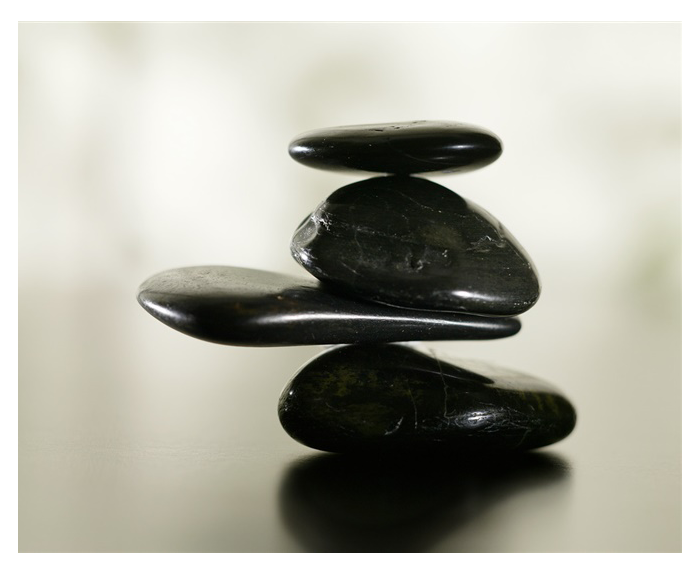 Repost from March 2015,
Repost from March 2015,  revised
revised  Monday, July 18, 2016 at 05:10PM
Monday, July 18, 2016 at 05:10PM  To everyone who conquers I will give some of the hidden manna, and I will give a white stone, and on the white stone is written a new name that no one knows except the one who receives it. ~ Revelation 2:17
To everyone who conquers I will give some of the hidden manna, and I will give a white stone, and on the white stone is written a new name that no one knows except the one who receives it. ~ Revelation 2:17
Today I’m intrigued with a smooth white stone, engraved with a name known only to God—and the path to that stone.
The setting for this single verse is the resurrected and glorious Jesus walking among oil-burning lampstands, speaking to believers huddled together against the attacks of a dying world. In every single case (he dictates seven letters) Jesus reminds us that overcoming is a practical, attainable hope. He himself is our example of overcoming—not by winning the next battle or election, but by laying down his life, even for those who hate him.
Our resurrected Lord teaches us that we discover the overcoming life only when the Father raises us again to a new kind of life.
The path to the white stone not only involves overcoming but also a secret supernatural food: the hidden manna, given from the Lord’s own hand. Sounds strange, doesn’t it? I have no firm idea what it means. Perhaps he’s talking about the sustaining life that comes from abiding with Jesus day-by-day, or perhaps yet another miracle wrapped in the wonder of the Eucharist. I know only that it is from him, and I hope to have the good sense to eat the bread he offers.
It is a Kingdom meal, served to those who sit at the banqueting table made possible by his life, death, and resurrection. No worldly connections can gain a seat at this table, but the poor, the sick, the lame, and the sinner will find an engraved place setting.
Finally: here, among the overcomers and the feast of the secret bread, Jesus presents a personal gift. Let the rich and famous have their swag bags. The swag of God is a small white stone, engraved with a name not even you yourself knew, but when you see it for the first time you immediately know it to be your true name, the name only a loving Creator can bestow. All your life you had the feeling that whoever you were, it wasn't really you. Not fully you. Not even you knew you. The name you learned to spell with great block letters as a child, the name that followed you through adolescence and adulthood, the name you handed to others like a business card—that name never fit. Not fully. But there was someone who knew who you really were. Someone who was calling you by that name, and the sound of his voice summoned you to a new identity.
Carl Jung said, “The world will ask you who you are, and if you do not know, the world will tell you.” He was only half right: while the world asks our name, Jesus reveals our name. While the world tries to twist our desires, Jesus serves the true food: food that satisfies and comes only from him. Only in the overcoming do we discover our destiny, and we overcome not by our effort but by his example. In fact, this same book reveals another secret: “They overcame because of the blood of the Lamb and because of the word of their testimony, and they did not love their life even when faced with death.” That's what he demonstrated by his own life; that's what we are called to imitate.
Only then will I know myself. I will find myself when I find him.
 Wednesday, July 6, 2016 at 08:24AM
Wednesday, July 6, 2016 at 08:24AM  I keep a dreadful secret from my friends at church. You see, where I worship, if you think the music’s too loud, you are definitely too old. The drugged-out neighbors near our building call the police to complain about the noise. The Kentucky Academy of Pediatrics has labeled our church the number one threat to children’s hearing in the state. Baby Boomers bring earplugs to church. All the guitar amps go to 11.
I keep a dreadful secret from my friends at church. You see, where I worship, if you think the music’s too loud, you are definitely too old. The drugged-out neighbors near our building call the police to complain about the noise. The Kentucky Academy of Pediatrics has labeled our church the number one threat to children’s hearing in the state. Baby Boomers bring earplugs to church. All the guitar amps go to 11.
But deep in the recesses of my iPhone, where no one can see my music collection, I have a playlist of gentle music. At my desk, I put in the ear buds and secretly dial it down. Because God lives in the still small sounds, too.
We’ve manufactured noise to a breathtaking level. One reason pipe organs and symphony orchestras were the rage during Bach and Mozart’s day was no one had ever heard such sound before—sound so full that patrons' hearts would burst at the fullness. Now, in the 21st century Bach, the Beatles, and Beyoncé all live inside my ear-buds.
Even more radical: sometimes I like no sound at all. Laptops, iPhones, iPads, and Satellite TV are just fine. But their use comes with a price. The price is silence, and in the silence God is speaking: “The LORD your God is with you, he is mighty to save. He will take great delight in you, he will quiet you with his love, he will rejoice over you with singing." (Zephaniah 3: 17) Can you imagine? Peace, quietness, confidence, and the chance to hear God Himself singing over you. Have you ever heard His song?
I used to think the silence meant God wasn’t speaking. Now, in the silence, he’s all I hear. As a young man I would look to the stars, overwhelmed by the beauty of the night sky. I knew from Psalm 19 that the heavens declared the glory of God. I could see his greatness, but could not hear his voice. Even in their majesty I would wonder why God was so silent. My prayers, especially at night, were filled with requests and concerns. I would list my needs one by one, unaware that my greatest need was stillness.
Of the many needs of North American believers, silence is among the greatest. Silence is the blank page on which God writes his word. Our noisy world scribbles on the page continually, overlaying sound and word on top of word and sound until the page becomes black. Unless the page is clean we cannot read what God has written.
The pathway of modern life has been hardened, trampled by words. Back in the day you had to visit Times Square; now Times Square visits you. The sower sows the seed but it falls on the path and is carried away by Sports Center, YouTube, NPR, Fox News, and of course our ubiquitous ear buds. Quiet is an aberration Drop any comedian into a monastery and he’ll have the monks doing hip-hop before it’s over. Even our Bibles are cluttered with sidebars and graphics, pictures and celebrity interpretations—Bible apps will read to us out loud.
But what if God is in the silence? He wasn’t in the whirlwind or earthquake for Elijah. The “still, small voice” is still a whisper. Perhaps the Father has his reasons for not raising is voice. I suspect it’s for our good that we find him in the secret place, well away from Times Square.
Why not create a secret place each day and give him just three minutes of blank slate? The Father doesn’t need a podcast to reach our hearts. If we find his presence in the silence it will be enough.
By the way, I’ve noticed that for many North American believers total silence may be too radical for starters. So if you promise to keep my secret from my loud church friends, I’d like to recommend quiet music for quiet times:
§ Chant, The Benedictine Monks of Santo Domingo de Silos. These guys have been rockin’ it old-school for 1500 hundred years.
§ Chants of the Russian Orthodox Church. Still quiet music, until the chimes and bells go nuts. These guys get a little rowdy—the Benedictines to the south think of this music as punk.
§ Love Came Down, Brian Johnson. A thousand years and a ten thousand miles from the monks comes an album from the Jesus Culture rockers. Don’t even call it unplugged. It’s sweet and gentle, and a pathway to His presence
For today, I’ll whisper the benediction: “Grace to you, and peace.”
 Tuesday, June 28, 2016 at 07:37AM
Tuesday, June 28, 2016 at 07:37AM  Last year I saw a real dancer dance. I sat just ten feet away and watched: I marveled at the motion. His leaps seemed effortless; his steps flowed like water; his hand opened a pathway through which his arm, his shoulder, his torso, and his legs followed. As I watched, the music melted away and I beheld motion, pure motion, become a paintbrush. Air was his canvas; the painting vanished after each step, yielding straightaway to another. When the dance ended, I was left with a memory of the painting. Months later, the memory remains.
Last year I saw a real dancer dance. I sat just ten feet away and watched: I marveled at the motion. His leaps seemed effortless; his steps flowed like water; his hand opened a pathway through which his arm, his shoulder, his torso, and his legs followed. As I watched, the music melted away and I beheld motion, pure motion, become a paintbrush. Air was his canvas; the painting vanished after each step, yielding straightaway to another. When the dance ended, I was left with a memory of the painting. Months later, the memory remains.
Nor is the memory about the dancer, but rather the dance. Although the dance did not exist apart from the dancer, he and the motion were indistinguishable. He disappeared in the dance.
The single word for this description is “graceful.” Yet such grace was anything but natural: this grace came as the result of years of discipline, practice, effort and sacrifice. The dancer, I’m sure, had fallen and suffered injury again and again. Certainly he had struggled with doubt, embarrassment, pain, fear, awkwardness, and discouragement. What emerged from the studio was a kind of resurrection, a resurrection of grace and beauty.
Grace grew from effort and focus. His motion inspired others. His art gave glory to God, and while it had the look of spontaneity it was anything but spur of the moment. Such grace grew from devotion: love of craft and creator.
I saw grace in motion, and my idea of grace deepened and grew. What he had done in the natural, I began to desire in the Spirit. What does grace look like in everyday life? No dictionary can tell the tale; no theologian can describe the beauty: we must see it firsthand—but look sharp, this kind of grace disappears as quickly as it comes.
What if grace dances all around us? What do you suppose such gracefulness looks like in our relationships with others? And in what studio do we learn the dance of divine love?
 Tuesday, June 21, 2016 at 08:11AM
Tuesday, June 21, 2016 at 08:11AM  “Where can I go from your Spirit? Where can I flee from your presence? If I go up to the heavens, you are there; if I make my bed in the depths, you are there.” Psalm 139:7-8
“Where can I go from your Spirit? Where can I flee from your presence? If I go up to the heavens, you are there; if I make my bed in the depths, you are there.” Psalm 139:7-8
Living among a busy and distracted people followers of Jesus need to live in God’s presence. We do not need a theology of his presence: we need the experience of his presence. He is here, now. Are we awake?
The first step in experiencing the presence of God is to take the Biblical witness seriously. We are told time and again that God is near—why does he feel so far? Worse still we’ve trained ourselves to dismiss the scripture as inspirational thoughts rather than a description of reality. To know his presence we must honestly evaluate whether our daily life matches God’s revelation of the way things really are. In Biblical narratives, in its poetry, in the gospels and in its letters the plain message of scripture is that God is highly relational and desires us to experience an awareness of him daily. Do we really believe this or desire this? This question is vital, because believing is seeing.
Second, we should order our lives in ways that allow us to experience his presence: we must train ourselves to recognize his presence. The spiritual practices of silence and solitude do not conjure up God’s presence; they help us awaken to God’s presence. In our day, more than any other time in history, there are distractions from the moment we wake until we fall asleep. Elijah found the presence of God in a “still small voice,” or as another translation pus it, “a gentle whisper.” (I Kings 19: 12) Most believers think prayer is talking to God, and it is—but only in part. The larger part is listening to him. Have you ever prayed without saying a word, but simply sitting in silence, tuning your ear to that gentle whisper? Why not seriously try silence and solitude for just ten minutes, or an hour—or a day! This is not mysticism; it is relationship.
Third, we should consider the joyful example of others. Throughout history the witness is consistent, that those who have been most aware of God’s presence have experienced a joy and peace that flow from life with him. Brother Lawrence, a 17th century Carmelite, discovered that daily activities did not have to block his awareness of God’s presence. He experienced “little reminders” from God that “set him on fire to the point that he felt a great impulse to shout praises, to sing, and to dance before the Lord with joy . . . the worst trial he could imagine was losing his sense of God’s presence, which had been with him for so long a time.” John Wesley, a buttoned-down English cleric, had experiences of God’s presence that changed his life and ministry. Wesley shared that God sent him “transports of joy” again and again. His case is particularly instructive today because in North America many church leaders emphasize scholarship over feelings, but Wesley had received the finest religious education his country could offer but he did not personally experience God’s presence until after he felt his heart “strangely warmed.” Those who would dismiss joyful behavior as mere emotionalism somehow fail to brand depression and despair as equally emotional expressions as the lack of God’s presence. The testimony of scripture is “you will fill me with joy in your presence, with eternal pleasures at your right hand.” (Psalm 16: 11)
Fourth, we need to consider more than our individual response to the presence of God. His presence has implications for our life together as the church. Together we are the people of God; he longs to bestow his presence on the assembled church. It is popular in our day to embrace Jesus and shun the church. Popular, but incorrect. For example, suppose I were to enter into a relationship with you, but refuse any relationship with your spouse. Would you accept friendship on these terms? “I like you, and I want to be with you, but please keep your spouse far away from me!” Such a friendship would be in peril from the beginning, and we put our relationship with Jesus in peril if we openly reject his bride.
Finally, there is one more expression of God’s presence available for disciples today—the power of God. John Wimber, founder or the Vineyard movement, said that power of God is in the presence of God. For those Christians who embrace the possibilities of miraculous signs and wonders in ministry, the secret is not to seek some special spiritual empowerment, but rather the tangible presence of God.
The earliest followers of Jesus understood that their beliefs had no authority in the world unless the presence of God was demonstrated after they proclaimed the coming of God’s Kingdom. In addition to forgiveness and reconciliation, the miracles of healing and liberation from demonic oppression authenticated the preaching of the gospel of the Kingdom of God. Those who heard the message of the Kingdom of God also witnessed the presence of God in their midst.
This short list is not complete. They are a starting point. Why not re-think your life in terms of this five suggestions: take the witness of the Bible seriously; order your life in a way to let him in; embrace joyful thanksgiving as a path to his presence; look for him in the church; and understand the connection between his presence and his power.
Here ends the lecture: let the lab begin!
 Tuesday, June 7, 2016 at 11:06AM
Tuesday, June 7, 2016 at 11:06AM  Some things we say so often it’s easy to forget they are powerfully, transformationally true. Like children reciting “E=Mc2” we are unaware of the power on our lips. In church services, for example, some liturgical phrases have the power to change the world. Consider the congregational greeting, “Peace be with you” and the group response, “And also with you.” It’s a simple exchange, offered and returned whenever God’s people gather.
Some things we say so often it’s easy to forget they are powerfully, transformationally true. Like children reciting “E=Mc2” we are unaware of the power on our lips. In church services, for example, some liturgical phrases have the power to change the world. Consider the congregational greeting, “Peace be with you” and the group response, “And also with you.” It’s a simple exchange, offered and returned whenever God’s people gather.
God’s peace is a gift. It is ours to receive and ours to give.
On the darkest night in history Jesus said to his friends, “Peace I leave with you; my peace I give you. I do not give to you as the world gives. Do not let your hearts be troubled and do not be afraid.” (John 14:27) Jesus had looked ahead: he saw the betrayal and violence that would arrive before sunrise. He saw the cross waiting for him. He wanted to equip his friends. He offered peace: a peace capable of overcoming troubled hearts and abject fear. He offered the inbreaking of a kingdom characterized by righteousness, peace, and joy. On that sacramental night, the high priest gave not only bread and wine: he gave peace as well.
His words were not a command; they were a gift. He did not offer Biblical instruction nor did he discuss strategic insight. Indeed, what he offered was beyond the disciples’ understanding--yet Jesus gave it anyway. He offered something from another world. In the Kingdom of God peace is something other than a high-minded ideal. Peace is how God equips his people. Peace is so real it can be carried and offered to others.
The antidotes to uncertainty and fear are not knowledge and courage, but peace: freely received, and freely given. Peace has been God's gift to you from the very beginning. He offered it that dark night. He offers it still.